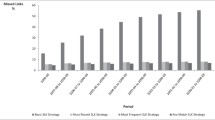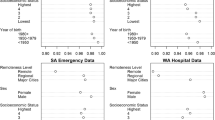Abstract
Assembling information about individuals over time allows health managers and researchers to describe the progression of diseases, the care history of individuals and the sequences of care episodes that potentially result in improving individuals’ health status. However, current mental health statistics generally focus on sets of events rather than groups of individuals making it impossible to distinguish between two different persons being admitted and the same person being admitted twice. Accurate figures on treatment prevalence cannot be generated and multiservice users across time or across agencies will inflate the statistics used to plan needed services. The capacity to link consistently defined bits of information together is critical to developing a reliable information system. This article examines the adequacy of using unique identifier codes to accomplish linkage by focusing on one example of record linkage that incorporates mental health information from both community and institutional sectors in one region of Ontario, Canada. Findings indicate that unique “cradle to grave” identifiers do not guarantee accuracy if manual transcription is involved.
Similar content being viewed by others
References
Graham RE:Building Community Support for People: A Plan for Mental Health in Ontario, Toronto: Ministry of Health, 1988.
Wasylenki D, Goering P, MacNaugton E: Planning mental health services: I. Background and key issues.Canadian Journal of Psychiatry 1992; 37:199–206.
National Health Information Council:Health Information for Canada. Report of the National Task Force on Health Information. Presented to the Minister of Health, 1991; p. 9.
Dunn HL: Record linkage.American Journal of Public Health 1946; 36:1412–1416.
Smith ME: Record linkage: Organizing the facts together. In: Bennett EM, Trute B (Eds.):Mental Health Systems: Problems and Prospects, New York: Edwin Mellen Press, 1983, pp. 263–281.
Trute B, Tefft B, Scuse D (Eds.):Human Service Information Systems: How to Design and Implement Them New York: Edwin Mellen Press, 1985.
Ontario Mental Health Foundation:A Minimum Data Set Recommended for Collection by All Psychiatric Facilities in Ontario, 1987.
Ministry of Health:Mental Health Act. Toronto: Queen’s Printer of Ontario, 1993.
Graham K, Brook RC: Analysis of an addictions treatment system,Evaluation and Program Planning 1985; 8:331–337.
Woogh CM: Patients with multiple admissions in a psychiatric record linkage system.Canadian Journal of Psychiatry 1990; 35:401–406.
Ministry of Health:Putting People First: The Reform of Mental Health Services in Ontario. Toronto: Queen’s Printer of Ontario, 1993.
Ellis RH, Wackwitz JH, Foster M: Uses of an empirically derived client typology based on level of functioning: Twelve years of the CCAR.Journal of Mental Health Administration 1991; 18(2):80–87.
American Psychiatric Association.Diagnostic and Statistical Manual of Mental Disorders (3rd ed., rev.). Washington, DC: Author, 1987.
Thunder Bay District and Kenora Rainy River District Health Councils:Regional Mental Health Study for Northwestern Ontario, 1992.
Dalrymple A, Lahti L:Northwestern Ontario Mental Health Data Development Report. Presented to the Thunder Bay and Kenora-Rainy River District Health Councils, 1992.
Hogan MF, Essock SM: Data and decisions: Can mental health management be knowledge-based?Journal of Mental Health Administration 1991; 18(1):12–20.
Author information
Authors and Affiliations
Additional information
Parts of this research were supported by an Ontario Mental Health Foundation (OMHF) grant to the first author to study data linkage systems and by a Hospital Incentives Fund grant. The opinions expressed herein are those of the authors and do not necessarily reflect the ministry of Health or the facility that sanctioned the research.
Rights and permissions
About this article
Cite this article
Dalrymple, A.J., Lahti, L.S., Hutchinson, L.J. et al. Record linkage in a regional mental health planning study: Accuracy of unique identifiers, reliability of sociodemographics, and estimating identification error. The Journal of Mental Health Administration 21, 185–192 (1994). https://doi.org/10.1007/BF02521325
Issue Date:
DOI: https://doi.org/10.1007/BF02521325




